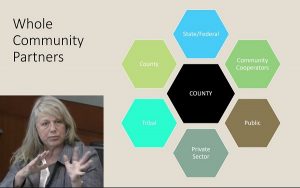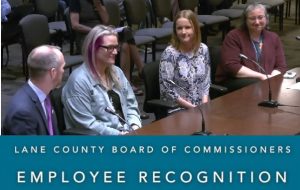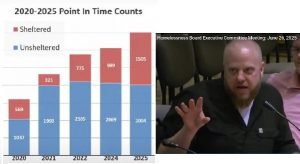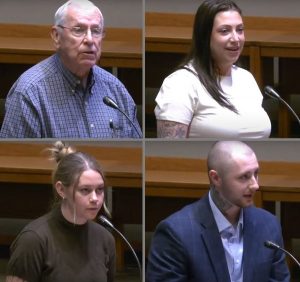Is Eugene a democracy? Part 1
5 min read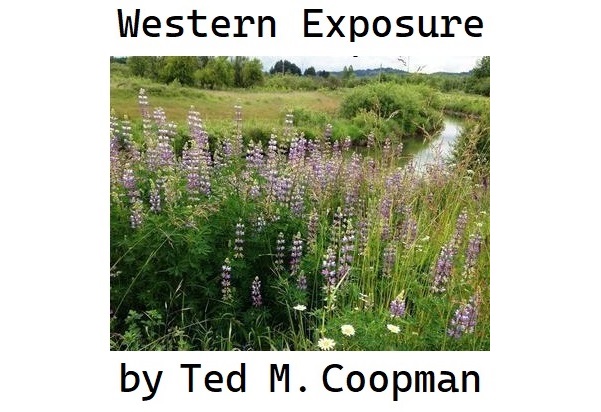
by Ted M. Coopman
Is Eugene a democracy? Technically, yes. Functionally, not so much. And that is on us.
How dysfunction functions
Defeated Ward 7 City Council candidate Barbie Walker recently lamented low voter turnout and argued people are apathetic because they feel disenfranchised by the perceived inability of elected officials to respond to voter concerns and deal with persistent problems.
Certainly, Eugene has some large and seemingly intractable problems – homelessness and housing at the top of the list. While the scope and scale of these challenges vary, they are widely shared across the state and region. Added to that are some serious unforced errors ranging from the city hall fiasco to the failed natural gas ban. To be fair to city councilors, they are playing a mediocre hand, and some are clearly out of their depth. Our representatives are also facing unprecedented intrusions into local control from an increasing maternalistic state government.
You get what you pay for
The median income for an individual in Eugene is about $26,000. A city councilor in Eugene makes about $18,000 a year while the mayor gets about $25,000. All are considered part-time positions, which create a variety of challenges:
Part-time positions can’t address full-time problems. I think we could agree that the scale of our challenges requires a full-time commitment by elected officials. Time and attention go to what pays the bills and potentially create conflicts of interest. Anyone who has held down multiple jobs knows the challenges. There are only so many hours in the day.
No help. Elected officials have no direct support staff to help with constituent inquires or manage calendars. Any questions or requests must be handled by the councilor themselves, who in turn, need to ask management or staff, wait for a response (if one is forthcoming), and then respond to the constituent. The volume of email is crushing.
Time and attention. The less time and attention you can give, the more you are at the mercy of city management, staff, and interest groups. Each month, there are hundreds of pages of often complex information to try and read and absorb. Councilors are more likely to respond to known entities and individuals. In a real sense, unelected city management “makes” policy by what information councilors get (or don’t) and how it is framed.
Shallow candidate pool. To afford to be an elected official in Eugene, you need to either have a full-time job in addition to political duties (such as meetings on Mondays and Wednesdays), be retired, independently wealthy, have an employed and very understanding partner, or be willing to live in poverty. Add the need for a base of support to raise tens of thousands of dollars for a campaign. Then reduce that again by the willingness to serve. Combined, that effectively eliminates a vast majority of residents and ensures that most candidates are from a very narrow demographic. Many city council races are (literally or effectively) uncontested. All this flies in the face of the concept of equity.
In Eugene, the elected city council and mayor only have one “employee” – the city manager. Everyone else in city government works for the city manager. Therefore, staff effectively work for the city manager and her team, not elected officials or those who voted for them. A vast majority of the information and options for action come from city staff since the city council and mayor do not have any staff of their own. The city manager has broad latitude on how (or if) policy gets enacted and, in the end, the only way to gain compliance is for a council majority to remove her.
City manager-led government emerged from the late 19th-early 20th century Progressive Era political reforms, driven by intense corruption and corporate excess. It gave us a professional government bureaucracy outside of political patronage, elected senators, and the ballot initiative.
A city manager, supposedly, would be immune from corruption or the influence of partisan politics (although Eugene city council and the mayoral races are “non-partisan”). The idea is that a technocrat would run a city and protect city operations and staff from political interference. There are a few problems here since everyone has an agenda and an ideology, professionals rarely stray from the orthodoxy of their disciplines, and standing between elected officials and operations also put the will of the public farther away from how (or if) things get done. In her defense, our city manager is not an autocrat and is simply fulfilling her role as she sees it. In practice, she is a professional working for amateurs.
Erosion of local control
The state government has taken unprecedented steps to micromanage cities by stepping into heretofore local domains, particularly land use. Not only does this blow up decades of painstaking public input and work done by elected officials, staff, and neighborhood volunteers on local planning, development, and infrastructure investment, it ignores the unique character and affordances of not just cities, but neighborhoods.
The differences in the physical and lived-in world of River Road versus Jefferson Westside, let alone Portland versus Eugene, is clear to see. It also destroys the utility of public input since it is easier for citizens to participate locally than in Salem. Conversely, it provides many advantages to larger business and interest groups, although that may be the point (more on that in Part 2).
Not only has the state mandated the elimination of single-family zoning (despite having a supermajority in both legislative houses, HB 2001 passed by one vote – in overtime) it has now decided that cities cannot require ANY parking for ANY project. No, really. It is somehow “climate friendly” because parking wastes space and makes housing less affordable and if you don’t provide parking people will get rid of their cars, unless they are electric, which is sort of okay, but that also means no at-home chargers, but maybe people can just ride EmX or bike everywhere. And if you believe any of that I can get you a great deal on the Ferry Street Bridge…
But wait! It gets worse… and maybe better?
Stay tuned for Part 2: Our broken public process, the democratic death spiral of voter apathy, and what can be done to fix it.
Western Exposure is a semi-regular column that looks at issues and challenges from a West Eugene perspective – a perspective that is often ignored or trivialized by city leadership and influential groups and individuals largely based in south and east Eugene.
Western Exposure rejects the fauxgressive party line, performative politics, and “unicorn ranching” policy in favor of pragmatism focused on the daily experiences of residents and small businesses in Eugene—and West Eugene in particular.
Ted M. Coopman has been involved in neighborhood issues since 2016 as an elected board member, and now chair, of Jefferson Westside Neighbors and has 30+ years experience as an activist and community organizer. He earned a Ph.D. in Communication (University of Washington) and served on the faculty at San Jose State University from 2007 to 2020.
Ted’s research on social movements, activist use of technology, media law and policy, and online pedagogy has been published and presented internationally and he taught classes ranging from research methodology to global media systems. He and his spouse live in Jefferson Westside with an energetic coltriever and some very demanding and prolific fruit trees.
